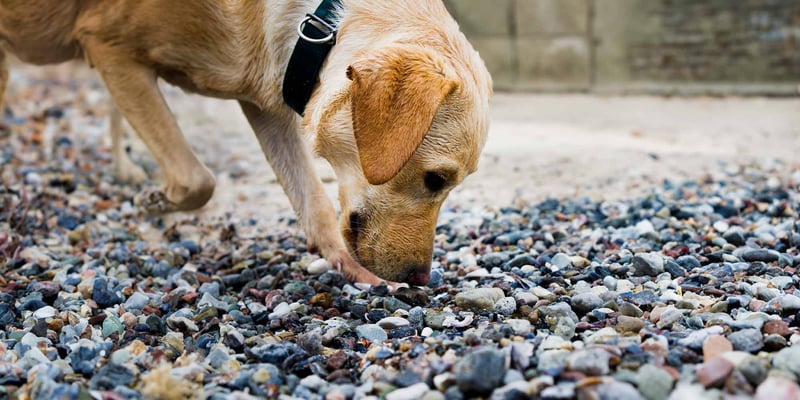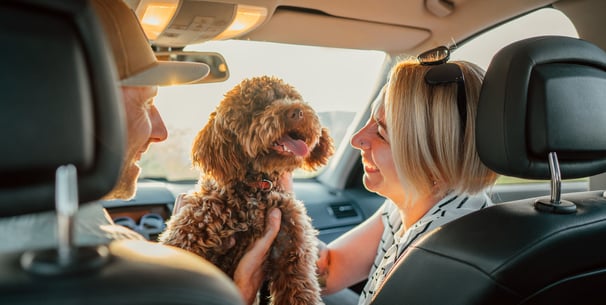Why Is My Dog Eating Stones? - Causes and Prevention
Index:



Introduction



Dogs eating stones is a huge cause for concern for many owners worldwide. Eating stones can be a sign of a nutritional deficiency, poor diet, and anxiety. Notably, this behaviour may also indicate the presence of a foreign object in their gastrointestinal system that they're trying to dislodge. This act can lead to choking, intestinal blockages, a perforated stomach, and damaged teeth, not to mention that it could be a symptom of an underlying medical disorder.
In this blog post, we’re here to discuss the reasons why dogs eat stones and how to prevent this behaviour. We'll be covering important topics such as ‘why do dogs eat stones?’, ‘how to stop dogs eating stones’ and ‘why does my dog eat stones?’. This discussion should help you better understand and care for your canine companion.
Reasons why dogs eat stones



Eating non-edible items is known as pica, which can be seen as one of many potential bad habits in dogs. Pica is a common condition in which a dog constantly craves and eats non-food items. For pica to be diagnosed, the dog must ingest the item not just chew it. Common items that dogs ingest include metal, plastic, clothes, rubbish, rocks and stones, paper, dirt, and poop, all of which can place their health in grave danger.
Some of the possible causes for dogs to eat stones include:
Boredom - Though pica can be the result of an illness or a deficiency, it is often due to a mental health condition such as boredom or anxiety. When a dog is bored, for example, when they’re not exercised or stimulated enough, they often turn to objects and ingest them.
Anxiety or stress - Similarly to boredom, anxiety is also a huge contributor to pica. Dogs who suffer from separation anxiety often chew and ingest items when their owners aren’t around which can be dangerous if they’re left on their own for long periods at a time.
Nutritional deficiencies - Poor diet or an unsuitable diet for your dog’s life stage can lead to your dog searching for minerals and vitamins in their own environment.
Medical conditions (e.g., gastrointestinal issues) - Irritable bowel syndrome, stomach tumours and hookworms are some of the most common gastrointestinal issues that can cause dogs to eat stones. Often, these conditions convince dogs that they are starving causing them to eat anything they can find, such as stones.
If you’ve noticed your dog eating stones, it’s essential to identify the cause. By seeking immediate veterinary care, your vet can effectively address the issue and create a treatment plan.
Dangers of dogs eating stones



We don’t need to explain how a dog eating stones is dangerous. However, some people believe their dog will eventually “pass” the stones through a bowel movement. Whilst we wish this was correct, it couldn’t be further from the truth. Ingesting stones can be painful and fatal.
Some of the most common risks and potential consequences of dogs eating stones include:
Choking - Stones come in all different shapes and sizes and aren’t easily broken up. If a dog swallows a stone they could quickly choke.
Dental damage - Because they can rarely be chewed, dogs can cause severe dental damage to their teeth and gums. Chewing on stones can lead to dental issues such as broken teeth, fractured jaws, or gum injuries. These conditions can be painful for the dog and may require dental treatments or extractions.
Intestinal blockage - Even if you notice stones in your dog’s stool and think the coast is clear, there may be some causing intestinal blockages which require immediate attention. Stones can cause blockages in the gastrointestinal tract, leading to severe discomfort, vomiting, diarrhoea, or even intestinal perforation. Surgery may be necessary to remove the obstruction and restore normal digestive function which can pose a long recovery time.
Internal injuries - Stones aren’t always round which means they can have sharp, jagged edges. Sadly, these can cause internal lacerations, bleeding, infections, and ulcers. Sometimes stones can contain harmful substances, such as chemicals, pesticides, or toxins from the environment. Ingesting such substances can result in poisoning or adverse health effects for dogs.
Quickly addressing stone-eating behaviour is crucial to protect your dog’s health. If you suspect your furry friend has been snacking on stones, speak to a vet immediately.
How to stop dogs eating stones



Getting a dog to stop eating stones is easier said than done, right? Well, we’ve got some great strategies to help you and your dog!
Firstly, providing mental stimulation and physical exercise is a great way to reduce boredom and subsequent stone eating. Mental stimulation can come in the form of providing your dog with puzzles, obstacle courses, and interactive feeding techniques. Mental stimulation also makes them generally happier!
Ensuring your dog has appropriate chew toys is also an excellent way to stop them from eating non-edible items. Chews such as yak chews are long-lasting and tasty meaning your dog is less likely to become distracted by stones.
Speaking to a dog trainer or behaviourist is a tactic likely to be recommended by your vet. A trained professional can help to address underlying anxiety or stress-related issues whilst helping your dog overcome them. All Waggel members get free access to behaviour and nutrition consultations with Junior from Companion Animal Wellness!
Addressing your dog’s diet is also important to stop them from continuing to eat stones. Ensuring it is balanced and not deficient in vitamins and minerals will help to stop your dog from attempting to find nutrition through non-edible items. Again, your vet will be able to advise you on the best food suitable for your dog.
If you think your dog’s stone-eating habits are unrelated to the above, it’s best to speak to your vet about potential medical issues that need to be addressed urgently.
Training techniques to discourage stone eating



Here are some training methods that can be used to discourage dogs from eating stones:
Teaching the "Leave It" command: This command is valuable for redirecting your dog's attention away from objects you want them to avoid, such as stones. Start by holding a treat in your hand and closing your fist.
Present your closed hand to your dog and say "Leave it". If they attempt to sniff, lick, or paw at your hand, keep it closed and wait for them to lose interest. As soon as they do, praise and reward them with a different treat. Repeat this exercise, gradually introducing the command in different situations with stones. With consistent practice, your dog will learn to associate the "Leave It" command with avoiding stones.
Positive reinforcement and redirection: Instead of scolding your dog for approaching stones, focus on positive reinforcement. Whenever you see your dog show interest in a stone but not eat it, praise and reward them with treats, toys, or verbal praise. Simultaneously, redirect their attention to a more appropriate item, such as a favourite toy or a game of fetch. By consistently rewarding and redirecting their focus, your dog will learn that engaging with you and the redirected item is more rewarding than eating stones.
Supervise your dog during outdoor playtime: One effective method is to closely monitor your dog when they are outside, particularly in areas where stones are present. Keep your dog on a leash or in a fenced area, allowing you to intervene immediately if they show an inclination to eat stones. By being present and vigilant, you can quickly redirect their behaviour and prevent stone consumption.
Creating a safe and stone-free environment: Minimise your dog's access to stones by thoroughly inspecting and removing them from your yard or outdoor areas where your dog spends time. Check for loose stones, pebbles, or gravel that can be potential temptations. Instead, provide your dog with safe and engaging toys that they can chew on or play with.
Remember, consistency and patience are essential when training dogs. Reinforcing positive behaviours, redirecting their attention, and creating a safe environment will help discourage your dog from eating stones over time.
When to seek professional help
Knowing your dog eats stones can be very worrying. It’s therefore important to consult with a vet if your dog eats excessive amounts of stones or is very persistent in their stone-eating, shows signs of distress or discomfort, or shows changes in behaviour or appetite.
If your dog continues to exhibit a strong desire to eat stones despite your training efforts and environmental modifications, it may indicate a deeper issue. Consulting a professional can help identify the underlying cause and develop a targeted behaviour modification plan.
If your dog shows signs of distress, discomfort, or pain while eating stones or after ingesting them, it could be an indication of an underlying medical condition. Swallowing stones can lead to digestive tract blockages, oral injuries, or other health complications. A veterinarian can perform a thorough examination to assess your dog's health and recommend appropriate medical intervention.
If your dog's stone-eating behaviour is accompanied by sudden changes in appetite, weight loss, lethargy, or other behavioural changes, it is crucial to consult a professional. These signs could indicate an underlying medical issue or a more severe behavioural problem that requires expert evaluation and intervention.
Professional help is vital for many reasons. Firstly, veterinarians have the expertise to provide an accurate diagnosis - they can determine if the problem is related to a medical issue or a behavioural problem. From here, they can develop a customised treatment plan based on your dog's specific needs and circumstances.
A professional can teach you effective techniques to manage and modify your dog's behaviour. They can provide you with the tools and knowledge to address the underlying causes of stone-eating and prevent it from recurring in the future.
Conclusion
So there we have it, our guide on the common problem of canine stone eating.
As pet owners, our pet’s health is very serious to us so it’s important to understand the reasons behind stone-eating behaviour and how to take the appropriate steps to prevent any potential health risks.
Knowing your dog has ingested something non-edible is very worrying which is why we’ve partnered with Joii to allow our members 24/7 access to online vet care.
Taking out a pet insurance policy is also a great way to keep your pet protected, it also protects you from costly vet bills. Luckily for you, we offer Lifetime policies and member benefits to all, why not get a quote today? It’s free and super easy.
Eating stones is a serious problem that can cause infection, lacerations, and even death. Though you may think your dog will pass the stone they’ve eaten, it could lead to permanent damage so it’s best to speak to a vet immediately.
The good news is that with a bit of patience, you can train your dog to stop eating stones. Working alongside your vet is very beneficial as you can find out if the problem is medical or behavioural. With a treatment plan in place, your dog can look forward to a stone-free diet.
If you’re curious about foods your dogs can and can’t eat, check out our guides on mackerel, tomatoes, and gravy, you may be surprised at what you find. We’ve also got articles such as ‘why is my dog licking his lips?’ - another very common dog owner query - not to mention health information on conditions such as ear mites.
Waggel Pet Insurance
Need more help? You're in luck if you're a Waggel Pet Insurance member. Along with our excellent coverage, we offer access to a 24/7 online vet to answer all your sticky questions, especially if you need grooming assistance.
Not a member? Why not get a quote now and cover your furry friend for a range of illnesses, all while enjoying our amazing perks and rewards.
Want more like this?
Get updates from us with helpful info, advice, answers to frequently asked questions and much more.
Index:
Related posts:
Get your quote
Along with our excellent coverage, we offer access to a 24/7 online vet to answer all your sticky questions.





